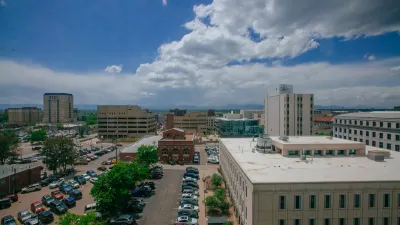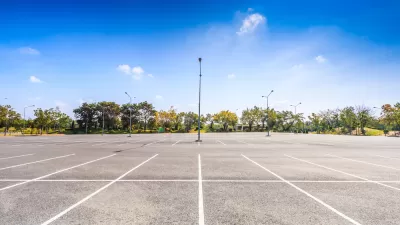Miami developers the Melo Group are paying renters to give up parking spaces, even though they already built the garage.
A Miami apartment building pays residents $100 a month if they don't park in the building's lot. "Across the U.S., cities enforce minimum parking requirements–laws that require new buildings to include a specific number of parking spaces, depending on the type of building," Ellie Anzilotti writes for Fast Company.
Miami is no exception, and that causes issues when space is at a premium and some would prefer to live in neighborhoods that aren't spread out by parking structures. "With cities like Miami already strapped for adequate housing, mandating developers to build spacious garages is fairly ludicrous, especially because further constricting available space for housing raises rents," Anzilotti writes.
Square Station a 34-story apartment building had to build a parking lot to conform to zoning codes, but to make a statement the developers (the Melo Group) are paying tenants not to use it. The building is right next to the city's light rail, and would seem to fit a non-driving lifestyle. Relaxing parking requirements is not just a politics for the group, building parking is a significant cost that they'd like to have the flexibility to offer or not. In the meantime, it's a nice pay day for walkers, bikers, and light rail riders.
FULL STORY: This new apartment building will pay you to ditch your car

Planetizen Federal Action Tracker
A weekly monitor of how Trump’s orders and actions are impacting planners and planning in America.

Maui's Vacation Rental Debate Turns Ugly
Verbal attacks, misinformation campaigns and fistfights plague a high-stakes debate to convert thousands of vacation rentals into long-term housing.

Restaurant Patios Were a Pandemic Win — Why Were They so Hard to Keep?
Social distancing requirements and changes in travel patterns prompted cities to pilot new uses for street and sidewalk space. Then it got complicated.

In California Battle of Housing vs. Environment, Housing Just Won
A new state law significantly limits the power of CEQA, an environmental review law that served as a powerful tool for blocking new development.

Boulder Eliminates Parking Minimums Citywide
Officials estimate the cost of building a single underground parking space at up to $100,000.

Orange County, Florida Adopts Largest US “Sprawl Repair” Code
The ‘Orange Code’ seeks to rectify decades of sprawl-inducing, car-oriented development.
Urban Design for Planners 1: Software Tools
This six-course series explores essential urban design concepts using open source software and equips planners with the tools they need to participate fully in the urban design process.
Planning for Universal Design
Learn the tools for implementing Universal Design in planning regulations.
Heyer Gruel & Associates PA
JM Goldson LLC
Custer County Colorado
City of Camden Redevelopment Agency
City of Astoria
Transportation Research & Education Center (TREC) at Portland State University
Jefferson Parish Government
Camden Redevelopment Agency
City of Claremont





























